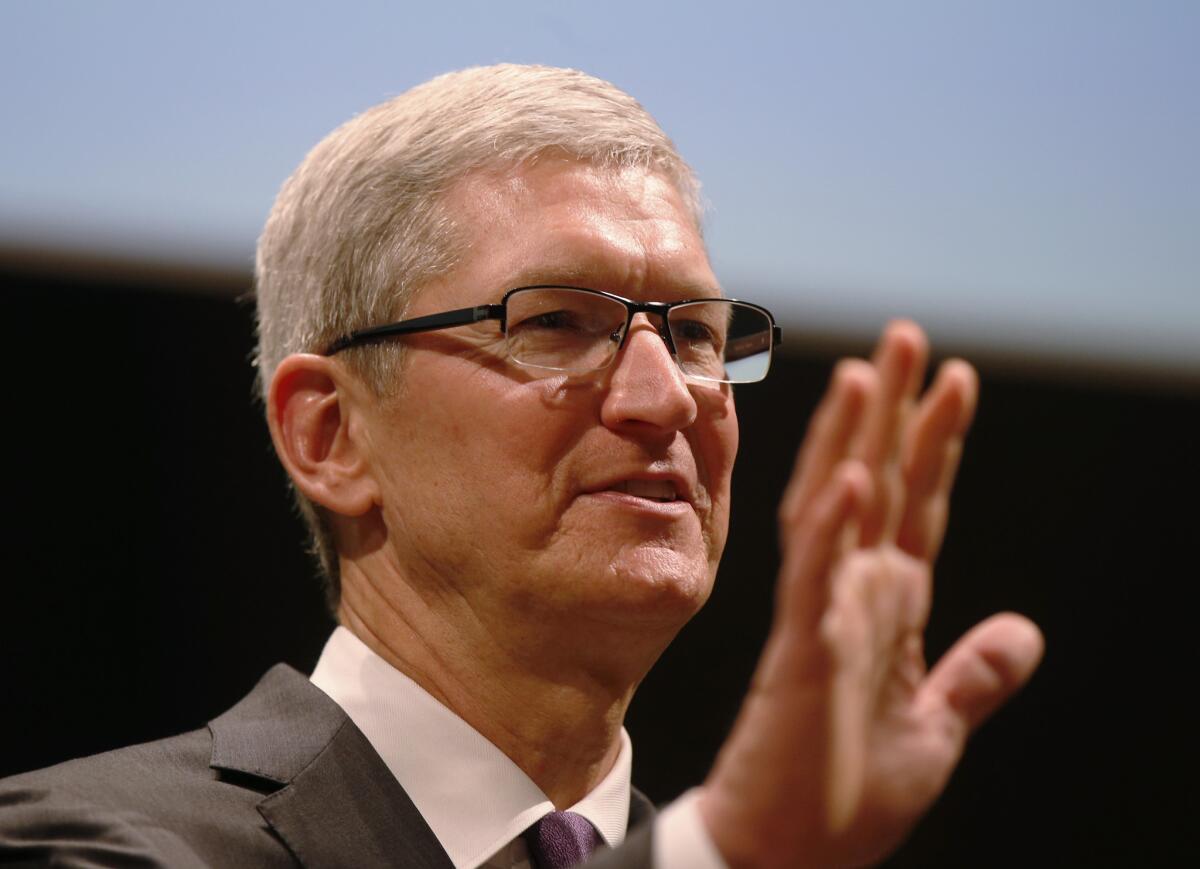Apple’s Tim Cook disappointed with Justice Department’s handling of San Bernardino case

Apple Chief Executive Tim Cook has engaged in a public war of words with the Justice Department over smartphone security.
- Share via
Apple Chief Executive Tim Cook said the Obama administration should have done more to work out a technical solution with his company before seeking a controversial court order in the San Bernardino terrorism investigation.
In an interview with ABC’s “World News Tonight” Wednesday, Cook said there should have been more dialogue between the company and the government before he learned from the media last week that a federal magistrate was compelling Apple to provide tools to unlock the iPhone of a shooter in the deadly terrorist attack.
Investigators and Apple had been collaborating for weeks to get into Syed Rizwan Farook’s iPhone, but the courtroom battle that’s now unfolding apparently blindsided Cook.
“I don’t think that’s the way the railroad should be run,” Cook said in the interview. “I don’t think something this important to the country should be handled in this way.”
The Justice Department didn’t have immediate comment.
FULL COVERAGE: Apple’s fight with the FBI >>
Apple is expected to formally respond to the court order on Friday, arguing that the magistrate has overreached in her use of an obscure law and infringed on the company’s 1st Amendment rights in issuing the order. The company has called for a federal commission to debate the privacy and crime-fighting issues raised by the case.
Apple is forcefully fighting the order because doing what the FBI wants “could expose people to incredible vulnerabilities,” “be bad for America” and “also set a bad precedent that I think many people in America would be offended by,” Cook told ABC. He described the FBI’s proposal as “the software equivalent of cancer.”
People probably carry more information about themselves on their phones than they store in their house, Cook said. In that environment, opening a backdoor for the government protects both privacy and public safety, he said.
Cook called each of the potential consequences of helping the FBI “knowns.” And when comparing them to the evidence investigators “might” be able to get from the iPhone, “I think we are making the right choice,” Cook said.
Join the conversation on Facebook >>
Authorities have all but pieced together the San Bernardino terrorists movements between the time of the attack and their deaths in a wild firefight with police hours later, but they cannot account for the couple’s whereabouts during an 18-minute period.
The FBI is also probing whether the couple received any help in plotting or carrying out the attacks.
FBI agents turned to Apple for help unlocking the device because several security measures introduced to iPhones in recent years have made data difficult to extract. Farook was a San Bernardino County health inspector who was issued the phone for his use on the job.
Cook said the FBI waited too long to get the Apple involved. There was a “crucial” missed opportunity to get some possible additional data when investigators had the county reset a password for Farook’s online back-up system.
“I wish they would have contacted us earlier,” Cook said.

Here’s everything you need to know about the fight between Apple and the FBI in two minutes.
Chat with me on Twitter @peard33
Times staff writers Maura Dolan and Joel Rubin contributed to this report.
MORE ON APPLE VS. FBI
Whether Apple or FBI is winning the PR war depends on which poll you’re looking at
Watch why Apple is fighting the FBI over iPhone security
Chinese tech execs side with Apple -- or maybe just against the FBI




